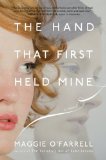Summary | Excerpt | Reading Guide | Reviews | Beyond the Book | Readalikes | Genres & Themes | Author Bio

A Novel
by Maggie O'Farrell
She is closing her eyes to the sea, to the presence of the castaside
book, when there is the sound of feet thudding through grass
and a voice, saying, ‘Sandra?’
She snaps upright as if she has received an electric shock. ‘Alexandra!’
she corrects. This is her name, given to her at birth, but her
mother later decided she didn’t like it and shortened it to its final
syllables.
‘Alexandra,’ the child repeats obediently. ‘Mother says, “What are
you doing and will you come in and—”’
‘Away!’ Alexandra screams. ‘Go away!’ And she returns crossly to
her stump, to the book, to her analysis of Death and its needless
pride.
At the exact same moment, half a mile away, Innes Kent - aged
thirty-four, art dealer, journalist, critic, self-confessed hedonist - is
kneeling on the dirt to examine the underside of his car. He has no
idea what he is looking for but feels that he ought to look anyway.
He is ever the optimist. The car is a silver and ice-blue MG; Innes
loves it more than almost anything else in the world and it has just
ground to a standstill at the side of this country lane. He straightens up.
And he does what he does in most situations that frustrate him: he
lights a cigarette. He gives the wheel an experimental kick, then
regrets it.
Innes has been in St Ives, visiting the studio of an artist whose
work he’d been hoping to buy. He had found the artist rather drunk
and the work far from completion. The whole excursion has been a
raging disaster. And now this. He grinds his cigarette underfoot, then
sets off down the lane. He can see a cluster of houses ahead, the
curved wall of a harbour reaching out into the sea. Someone will
know the whereabouts of a garage, if they have garages in this godforsaken
place.
Alexandra does not - cannot - know the proximity of Innes Kent.
She doesn’t know that he is coming, getting ever closer with every
passing second, walking in his hand-made shoes along the roads that
separate them, the distance between them shrinking with every wellshod
step. Life as she will know it is about to begin but she is
absorbed, finally, in her reading, in a long-dead man’s struggle with
mortality.
As Innes Kent turns into her road, Alexandra raises her head. She
places the book on the ground again, this time more gently, and
stretches, her arms held high. She twirls a strand of hair between
finger and thumb, hooks a daisy between her toes and plucks it -
she has always had gymnastic joints; it is something of which she is
rather proud. She does this again and again until all eight gaps between
her toes hold the frank yellow eye of a daisy.
Innes comes to a halt beside a gap in a thick hedge. He peers
through. A pretty sort of country house with bushes, grass, flowers,
that kind of thing - a garden, he supposes. Then he sees, close by,
seated under a tree, a woman. Innes’s interest never fails to be piqued
by the proximity of a woman.
This specimen is without shoes, hair held off her neck in a yellow
scarf. He raises himself on tiptoe to see better. The most exquisite
column of a neck, he decides. If he were pressed to write a description
of it, he would be forced to employ the word ‘sculptural’ and
possibly even ‘alabaster’, which are not terms he would bandy about
lightly. Innes’s background is in art. Or perhaps ‘foreground’ would
be a more accurate term. Art is not a background for Innes. It is what
he breathes, what makes life continue; he looks and he doesn’t see
a tree, a car, a street, he sees a potential still-life, he sees an interplay
of light and shade and colour, he sees a deliberate arrangement
of chosen objects.
And what he sees when he looks at Alexandra in her yellow scarf
and blue dress is a scene from a fresco. Innes believes he is beholding
a perfect rural madonna, in profile, in a marvellously - he thinks -
tight-fitting blue frock, with her baby slumbering a few feet away.
He shuts one eye and regards the scene first with one eye, then the
other. Really, it’s a beautiful composition, with the tree overhead
counterpointed by the flat stretch of grass and the uprightness of the
woman and her neck. He would like to see it painted by one of
the Italian masters, by Piero della Francesca or Andrea del Sarto
perhaps. She can even pick flowers with her toes! What a creature!
Innes is smiling to himself, trying it out again with both eyes,
when the scene is shattered by the madonna saying in a clear voice,
‘Don’t you know it’s very bad manners to spy on people?’
Excerpted from Hand that First Held Mine by Maggie O'Farrell. Copyright © 2010 by Maggie O'Farrell. Excerpted by permission of Houghton Mifflin. All rights reserved. No part of this excerpt may be reproduced or reprinted without permission in writing from the publisher.




Fanaticism consists in redoubling your effort when you have forgotten your aim
Click Here to find out who said this, as well as discovering other famous literary quotes!
Your guide toexceptional books
BookBrowse seeks out and recommends the best in contemporary fiction and nonfiction—books that not only engage and entertain but also deepen our understanding of ourselves and the world around us.